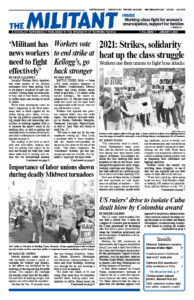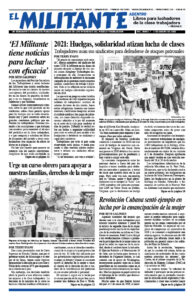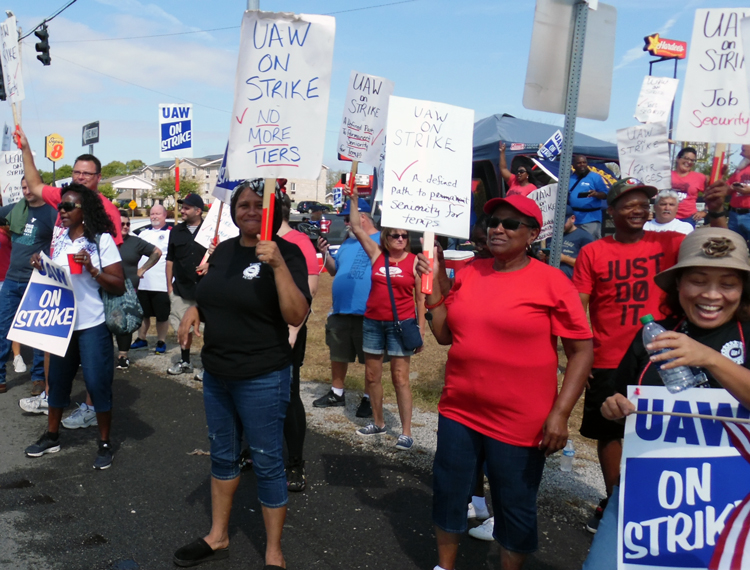Natural disasters under capitalist rule inevitably become a social catastrophe for workers and farmers, as the effects are multiplied by the workings of the dog-eat-dog for-profit system. This exposes the contempt the wealthy rulers have for the safety, life and limb of working people, how workers are left to fend for ourselves.
The horrific Dec. 10 tornado storm that tore through Kentucky, Arkansas, Illinois, Missouri, Mississippi and Tennessee, shattering homes, factories and other buildings, throwing cars through the air and derailing a train is such an example.
The death toll stands at 92 and rising after more than 40 tornadoes touched down, leaving many communities in rubble. Power hasn’t yet been fully restored.
Eight workers were killed when the Mayfield Consumer Products candle factory in Mayfield, Kentucky, was leveled by the storm. The plant, with a majority Latino workforce, has been running round-the-clock to meet holiday demands. When tornado sirens began to sound and weather bureau warnings to take shelter were being mass-texted to the population, the candle plant bosses, instead of calling off the shift, were determined to keep the factory running rather than lose production. They then had workers “shelter” in a hallway. There was no underground tornado shelter in the plant.
“It should have been shut down,” Chelsea Logue, 22, a worker there, told the Louisville Courier-Journal. Logue was buried alive in the rubble until she and co-workers clawed their way out.
“When we went around and started asking if we could go home, one of the HR (human resources) ladies told us that if we went home, we were going to be terminated because it was considered abandonment of our job,” said candle factory worker Sarah Atkins.
“They knew it was heading toward us,” plant worker Jennifer Sanchez-Flores, 23, said. “By the time they told us to go back to work, they should have said, ‘Hey, this might be coming straight toward us. Go home.’ They should have sent us home.”
In Edwardsville, Illinois, the storm ripped huge chunks of the steel roof off and collapsed the walls of one of the Amazon warehouses in town, leaving dozens of workers trapped, buried in debris, and with cars tossed on top of them. Amazon bosses, like the candle factory bosses, unwilling to sacrifice holiday profits, had kept workers on the job. Six died. The company’s profits jumped 84% last year during the pandemic.
The bosses at Amazon are fiercely anti-union. There was no union at Mayfield Consumer Products, where the starting wage is $8 an hour.
The conditions there — especially the bosses’ refusal to shut down and the lack of a proper tornado underground shelter — are in sharp contrast to the situation at a unionized Kentucky General Motors Corvette factory that was also hit by a tornado with 150 mph winds. This underlines how much workers need labor unions.
What a difference a union makes
There were 20 to 30 members of United Auto Workers Local 2164 still working after the second shift ended at the Corvette plant in Bowling Green. But, because of the union, these workers were able to take cover in a designated basement tornado shelter.
“Thankfully all the systems in the plant worked,” Jason Watson, shop chairman for Local 2164, told the Detroit Free Press. “The take-shelter alerts that are broadcast … people took cover and once the all-clear sounded they were permitted to go home. None of them said they were scared, because they couldn’t tell what was going on. When you’re in the basement, a bomb could go off and you wouldn’t hear it.”
The plant suffered serious damage, with the roof and an employees entrance on fire. “There’s all kinds of visible damage throughout the building and structural things,” Watson said. At least 122 Corvettes already built there were destroyed.
Many workers’ homes were damaged by the storm as well. “Our union hall has spearheaded all of those efforts to determine who may need help or what kind of help may be needed,” Watson said.
After extensive repair work — including the labor of 90 skilled trades Local 2164 members — the plant began to reopen Dec. 20. The union received a slew of donated gift cards to help local members with repairs at home and to get by on layoff while repairs were being made. The number of cards was so generous, Watson said, the union is sharing them with others in the community who suffered tornado destruction.
The 1,200 UAW workers in Bowling Green were part of the GM-wide auto strike in the fall of 2019, where one of the big issues was fighting against the bosses’ push for a divisive two-tier wage setup.
“We’re not doing this for us, we’re doing it for everyone in the country,” striker Dennis Wyatt, a 35-year pipefitter, told the Militant on the picket line at that time. “If we can get a little something, then maybe other workers will say, ‘Hey, maybe we need a union.’”


